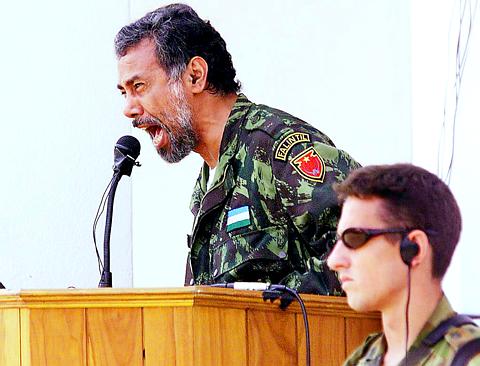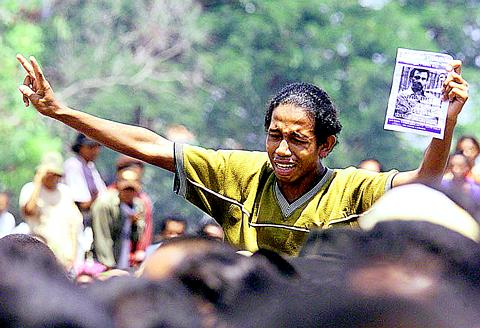In an overwhelmingly emotional homecoming, exiled guerrilla leader Xanana Gusmao returned to his ravaged capital yesterday and was greeted by a crowd of thousands who wept, cheered and roared: "Viva East Timor!"
The arrival of the charismatic rebel leader, who is likely to become East Timor's first president, is for many here the most powerful symbol yet of the territory's coming independence, and of an end to its bloody quarter-century struggle to break free of Indonesia.
"We have shown the whole world, we have shown Indonesia, we have shown ourselves that we have the courage to fight for independence for 25 years," Gusmao, bareheaded and clad in military fatigues, told a crowd of about 5,000 ragged people packed into a seaside plaza in front of the white-washed, Portuguese colonial-era governor's office.

PHOTO: AFP
"It has been a very difficult struggle," said the 53-year-old rebel leader with graying hair and beard, often sounding and looking on the verge of tears. "Our sorrow has lasted too long."
Many in the crowd wept with him, but jubilation predominated. People danced up and down with excitement, held up children to catch a glimpse of Gusmao, and waved the parasols they had brought to shield themselves from the blazing sun. Three old women pounded on homemade drums to celebrate.
Gusmao, who was secretly flown back into East Timor Thursday night by the peacekeeping forces who arrived a month ago, urged the world to help rebuild the province, which was devastated in a rampage by Indonesian forces and their militia allies after it voted for independence.

PHOTO: AFP
"There is much to do to recover, to save our homeland, to save ourselves," he told the crowd, speaking in the indigenous Tetum language. "All of us must try to let go of the bad things they have done to us. Tomorrow is ours."
Gusmao was joined on the podium where he spoke by Taur Matan Ruak, who commanded the pro-independence Falintil rebel group in Gusmao's absence.
Ordinary East Timorese learned of his arrival just two hours before he spoke, when loudspeaker trucks drove through the city streets announcing he would give a speech.
People streamed toward the seafront plaza on scooters, on foot and in ramshackle trucks and cars, but many were still arriving when the 25-minute speech ended. One old man who got there too late to hear Gusmao speak burst into tears.
Gusmao was flown from Darwin, Australia, to Baucau, East Timor, in a Royal Australian Air Force C-130 Hercules on Thursday night and then taken to Dili, the capital, in a US Blackhawk helicopter, peacekeeping commander Major General Peter Cosgrove told reporters.
Cosgrove called it a "joyous day for the people of East Timor" and praised Gusmao as statesman and a "wise and mature" leader.
Roque Rodrigues, chief of staff of Gusmao's resistance movement, said in Darwin that the group had kept Gusmao's movements secret for security reasons.
Gusmao was captured by Indonesian troops in 1992 and was imprisoned until last month. Earlier this year he was placed under house arrest as part of a UN-sponsored deal to settle the ongoing conflict in East Timor.
After East Timor's 850,000 people voted overwhelmingly for independence in an Aug. 30 referendum, he was released and made the rounds of Western capitals appealing for international intervention in the territory.
Following the deadly rampage by pro-Indonesia militias, the UN authorized an international peacekeeping force that arrived in East Timor on Sept. 20 to restore order.
Gusmao's arrival comes two days after the Indonesian parliament endorsed the results of East Timor's independence referendum, effectively relinquishing control of the province.
Security was heavy, and armored personnel carriers were stationed around the square. Scores of peacekeepers wearing full combat gear patrolled the area, and troops stationed on the balconies kept watch with binoculars, guns at the ready.
Gusmao is a folk hero to many East Timorese, but has come under some criticism for not instructing Falantil guerrillas to fight back after pro-Jakarta militia and Indonesian forces went on their rampage last month.

The paramount chief of a volcanic island in Vanuatu yesterday said that he was “very impressed” by a UN court’s declaration that countries must tackle climate change. Vanuatu spearheaded the legal case at the International Court of Justice in The Hague, Netherlands, which on Wednesday ruled that countries have a duty to protect against the threat of a warming planet. “I’m very impressed,” George Bumseng, the top chief of the Pacific archipelago’s island of Ambrym, told reporters in the capital, Port Vila. “We have been waiting for this decision for a long time because we have been victims of this climate change for

MASSIVE LOSS: If the next recall votes also fail, it would signal that the administration of President William Lai would continue to face strong resistance within the legislature The results of recall votes yesterday dealt a blow to the Democratic Progressive Party’s (DPP) efforts to overturn the opposition-controlled legislature, as all 24 Chinese Nationalist Party (KMT) lawmakers survived the recall bids. Backed by President William Lai’s (賴清德) DPP, civic groups led the recall drive, seeking to remove 31 out of 39 KMT lawmakers from the 113-seat legislature, in which the KMT and the Taiwan People’s Party (TPP) together hold a majority with 62 seats, while the DPP holds 51 seats. The scale of the recall elections was unprecedented, with another seven KMT lawmakers facing similar votes on Aug. 23. For a

Taiwan must invest in artificial intelligence (AI) and robotics to keep abreast of the next technological leap toward automation, Vice President Hsiao Bi-khim (蕭美琴) said at the luanch ceremony of Taiwan AI and Robots Alliance yesterday. The world is on the cusp of a new industrial revolution centered on AI and robotics, which would likely lead to a thorough transformation of human society, she told an event marking the establishment of a national AI and robotics alliance in Taipei. The arrival of the next industrial revolution could be a matter of years, she said. The pace of automation in the global economy can

All 24 lawmakers of the main opposition Chinese Nationalists Party (KMT) on Saturday survived historical nationwide recall elections, ensuring that the KMT along with Taiwan People’s Party (TPP) lawmakers will maintain opposition control of the legislature. Recall votes against all 24 KMT lawmakers as well as Hsinchu Mayor Ann Kao (高虹安) and KMT legislative caucus whip Fu Kun-chi (傅崐萁) failed to pass, according to Central Election Commission (CEC) figures. In only six of the 24 recall votes did the ballots cast in favor of the recall even meet the threshold of 25 percent of eligible voters needed for the recall to pass,